The following passage is from the recently published novel, “Arse Over Teakettle” (Book One of the Toronto Trilogy), a heart-warming story about a family struggling with the horrors of the Second World War in Toronto. It is an imaginative tale of a boy learning about life and exploring his sexuality in a decade when, despite the moral upheavals of the war years, society attempted to maintain traditional values. One of the most humorous parts of the book is when the fictional character, seven-year old Tom Hudson, learns sexual information from the older boys, while he is in the back laneway.
In 1945, the year the war ended, New Year’s Eve was a particularly poignant moment as it was the first “peace time” celebration of the event in six long years. A few of the names, places and events mentioned in this passage might produce a few smiles for those who remember Toronto’s past.
New Year’s Eve in Toronto in 1945.
When New Year’ Eve arrived in 1945, people were anxious to celebrate, especially after the privations and gloom of the war years. Most of the tickets for the nightclubs, restaurants, and bars had disappeared well in advance. The Savarin Tavern, on the west side of Bay Street, south of Queen Street West, had been sold out for the New Year’s Eve dinner for weeks. The Royal York Hotel’s bash featured “Mart Kenny and his Orchestra,” with Norma Locke as soloist. Supper began at 10 p.m., followed by dancing, with champagne served at midnight. The cost was six dollars per person. At the Palais Royale was Bert Niosi’s Orchestra.
On the “Eve of Eves,” as guests arrived, they noticed that on the dance floors, military uniforms were in a minority, as trailing formal gowns adorned with corsages, and dinner jackets or tails predominated. Everyone ignored the odour of mothballs. The most popular song was “Chickery Chick,” but the tune “Little Brown Jug” was also a favourite, as well as the most common container hidden beneath the tables.
Attending a movie theatre was a modest alternative to the expensive dance clubs and dinner venues. Movie studios released some of their most important films during the Christmas season, anticipating the extra attendance. During the festive week, Walt Disney’s “Fantasia” was at the Elgin. At the Tivoli, at Adelaide and Victoria Streets, and at the Eglinton Theatre was Cecil B. DeMilles’, “Crusades,” starring Loretta Young and Henry Wilcox. At the Imperial was Disney’s cartoon feature, “Pinocchio,” containing the hit song, “When You Wish Upon a Star.” Loew’s Uptown featured Lana Turner, Ginger Rogers, Walter Pidgeon, and Van Johnson in “Weekend at the Waldorf.”
It was Lana Turner who said, “A successful man is a man who earns more money than his wife is capable of spending. A successful woman is one who can find such a man.”
On this New Year’ Eve, in our home, during the hours leading up to midnight, the adults quietly chatted and joked, the music from the radio playing in the background. The song “Sentimental Journey”—Gonna take a Sentimental Journey, Gonna set my heart at ease.—was one of the year’s biggest hits, and the wartime song “Bell Bottom Trousers,” remained popular. My brother and I played the card games that we had received for Christmas. Shortly after the hour of ten, my brother and I climbed the stairs to bed.
By eleven o’clock, the streets of Toronto were empty, as the severity of the cold forced the populace to remain indoors. Wind whistled through the empty avenues above and below the Davenport Hill, and across the solitudes of the great Toronto valleys. However, inside the downtown clubs and restaurants the revelries were increasing in volume as the final hour of the old year ticked away.
At the Royal York, a cute young blonde wandered among the tables holding a bottle of Worcestershire Sauce, slurring her words as she inquired, “Anyone want a snort?”
An elderly gentleman whispered to a male friend, “I’d appreciate a “snort” with her any day.”
They both grinned like schoolboys.
When the magic moment arrived, a scantily clad “Miss “1946” arrived in the ballroom. Shouts and cheers exploded, as the tensions of the war years receded from memory. They chorused the words “Happy New Year” with greater sincerity than previous years.
In our house, the midnight hour was again subdued, unlike the downtown scene or even the local beverage room, the Oakwood Hotel. When the adults brought in the New Year, my brother and I were fast asleep. Tell and Charlie were with my parents, and they all indulged in a sip of the sinful juice. As mentioned, my mother did not consider port or sherry to be alcoholic, even though it contained more alcohol than either beer or wine. I suppose she rationalized this by thinking that at least they were not consuming “hard” liquor. Many maiden aunts throughout the years had engaged in similar reasoning, declaring that they never drank spirits, but did occasionally enjoy a tipple of sherry.
Wise old ladies!
Soon after midnight, downtown, the most common phrase was, “Is this taxi taken?”
The following morning, the most common phrase throughout the city was, “Has anyone seen the Aspirin bottle?”
A link to information on the book “Arse Over Teakettle”:https://tayloronhistory.com/arse-over-teakettle/
A link to the publisher to order this book: “Arse Over Teakettle”: http://bookstore.iuniverse.com/Products/SKU-000132634/Arse-Over-Teakettle.aspx
The authors Home Page: https://tayloronhistory.com/
